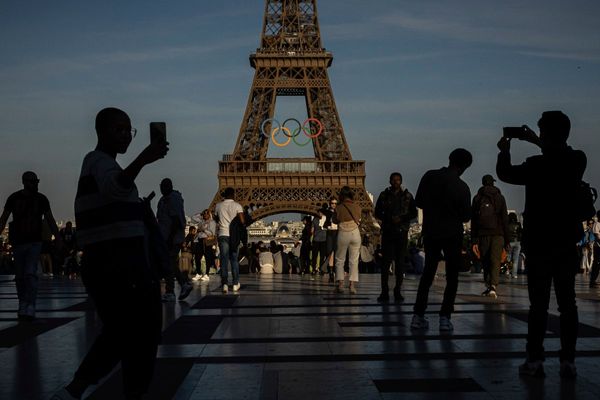
Window washer stuck 240m above Madrid during blackout tells his story
In Spain, harrowing stories have continued to emerge after much of the Iberian Peninsula was plunged into an hours-long blackout earlier this week.
Jonathan Bernal, a window washer in Madrid, has detailed how he and a co-worker were cleaning the outside windows of a skyscraper when the power went out. For four hours they ended up stranded on hanging scaffolding, some 240 metres above the city.
“It was overwhelming, the uncertainty of it all,” he told broadcaster Cuatro.
The pair had been cleaning windows on the 34rd floor of the building when Bernal’s co-worker realised that the lights had gone out on their machine. “There was nothing; no lights, all the breakers were down, all the safeties were off,” said Bernal.
As per the company’s emergency protocol, they picked up the company phone to call for help. But the blackout, which grounded flights, paralysed trains and metros and knocked out traffic lights across much of Spain and Portugal, had also cut off mobile communications.
“There was no signal,” said Bernal, recounting how they tried to call with their personal phones after the company phone wouldn’t work. “We kept trying to call, by WhatsApp, by phone line. We were desperate.”
He managed to catch a tiny bit of signal on his own phone – not enough to reach anyone but enough to allow an alert to come through, informing them that Spain had been plunged into a blackout. “We thought, ‘now what do we do? How do we get people to locate and rescue us?’”
While there was no way to open the windows where they were, the pair managed to get the attention of two women inside. Using the screens on their mobile phones to communicate, Bernal and his co-worker explained their dilemma. “All we could think of was ‘please come get us now,’” he said.
Over the next few hours, a small crowd steadily gathered below, from their supervisor to emergency workers and the building’s management. Finally, a co-worker began climbing the stairs of the building to reach the 58th floor, where a machine controlling the scaffolding was located.
“There’s a handbrake lever there that needs to be released slowly to allow us to descend,” said Bernal. “If it goes too fast, however, there’s a safety mechanism that kicks in and halts the descent.”
After four hours spent dangling over Madrid, they were slowly, painstakingly lowered to the ground.
The next day, as Bernal was headed back to work, he instead found himself again grappling with fallout from the blackout.
He had turned up early on the morning, only to find the metro line he needed was closed. “I stayed there until nearly 10am and I had no choice but to return home,” he said.
Updated
EU inquiries into causes of Spain, Portugal blackouts continue
The power is back on in Spain and Portugal, but the inquiries into the causes of the massive blackouts on the Iberian peninsula are only just beginning. Under EU law at least two investigations are expected to be triggered following Monday’s huge power cuts.
From the end of the crisis being declared, Spain and Portugal each have three months to issue a report setting out causes, impact and necessary improvements to avoid a repeat scenario. The two countries could issue a joint report.
Separately an expert panel is expected to convene, led by a grid-system expert from a non-affected country. This kind of panel is organised to examine the most serious power cuts. While the Iberian peninsula outage is yet to be classified on the serious incident scale, previous less wide-ranging blackouts have been classified as major incidents, triggering such investigations.
The expert panel will include representatives from transmission system operators from all affected countries. The EU Agency for the Cooperation of Energy Regulators, intended to ensure the smooth running of Europe’s single market for electricity, will also be invited.
The report from this panel takes more time than the national reports; within six months they have to present a technical fact-finding report, followed later by a final report setting out recommendations.
Speaking of controversial or unpopular regulations that Merz talked about earlier (9:42), our Berlin correspondent Deborah Cole has one unusual example for you – and it’s about dogs.
Half of the pet dogs in Berlin are being kept illegally owing to a suspected “boycott” of unpopular registration rules rolled out after a surge in ownership during the pandemic, figures have shown.
Dogs have long been taxed in the German capital, primarily for sanitation costs.
However, a policy introduced in 2022 requiring every owner to also register their pooch with data from an implanted microchip – mandatory from the age of three months – prompted a backlash over the additional expense and nuisance.
German economy grows marginally faster than expected
In other slightly encouraging news for the new government, the German economy grew faster than expected at the start of the year, AFP reported.
Gross domestic product (GDP) in Europe’s biggest economy expanded 0.2 percent from January to March compared to the previous quarter, according to provisional figures from federal statistics agency Destatis.
This was better than a forecast of 0.1 percent by analysts surveyed by financial data firm FactSet, and followed a 0.2 percent contraction at the end of last year, AFP noted.
After two years of contraction driven by surging energy prices after Russia invaded Ukraine and post-pandemic supply chain woes, the German economy was expected to start making a modest recovery this year, AFP said, but it noted that the government last week downgraded its growth forecast for 2025 to zero, blaming Trump’s sweeping tariffs.
SPD's co-leader Klingbeil to serve as vice-chancellor, finance minister
SPD’s secretary general Matthias Miersch just spoke at a press conference on the members’ vote.
He said the SPD’s final picks for ministers will be presented on 5 May, ahead of the formal confirmation of Friedrich Merz as the chancellor the following day.
But he confirmed that SPD’s Lars Klingbeil will be the vice-chancellor and federal finance minister in the new government.
Miersch also thanked for “strong grassroots support” for the deal, and said he hoped that some scepticism in parts of the party could be overcome, so “even those who voted no will ultimately see it was worth joining this government and standing up for the basic social democratic values.”
Focus shifts to first 100 days of Merz's government - snap analysis
Marion Muehlberger, economist and political analyst at Deutsche Bank Research:
“SPD members have approved the coalition agreement, as hoped, and cleared the way for the election of the next German chancellor on 6 May.
Markets will now be focused on the new government’s 100-day programme, which is expected to be announced next week.
How quickly the new government draws up the budget (and whether it will be passed before the summer break) will be decisive for whether economic policy impulses contained in the 100-day programme can still take effect over the summer.”
Social Democrats approve German coalition deal
And it’s now done: SPD members have approved the coalition deal with the overwhelming “yes” from 84.6% of those who cast their votes.
15.4% voted against, with 56% turnout, SPD said in a social media update.
In a separate emailed update, SPD’s secretary general Matthias Miersch said “in these very difficult times in global politics, we bear responsibility for our security, for economic growth, secure jobs and equal opportunities,” Reuters reported.
The approval paves the way for Friedrich Merz to be confirmed as the next German chancellor next week.
Updated
Multiple people questioned as part of Uppsala investigation
Speaking at a press conference, chief of Uppsala police, Erik Åkerlund, said that multiple people were questioned as part of the “fast-paced” investigation over night, with one arrest made.
He also confirmed that the attack took place in a hair salon.
Åkerlund said the shooting appeared to be an isolated incident and was deemed to not be an active threat as Swedes prepare for the Walpurgis night celebrations tonight.
Updated
Swedish police arrest Uppsala shooting suspect
Elsewhere, Swedish police said they have apprehended a suspect after a shooting in which three people were killed in the city of Uppsala on Tuesday, Reuters reported.
A large area was cordoned off in the centre of Uppsala, a university city 45 miles north of Stockholm, after witnesses described hearing multiple shots at about 5pm local time and seeing people running in different directions and hiding.
A masked person was seen fleeing the crime scene on an electric scooter.
Morning opening: Is this a Ja, SPD?
Germany could see its next government all but confirmed today, as the Social Democrats (SPD) are set to confirm how its 358,000 members voted on the coalition agreement with the conservative CDU/CSU.
The vote closed just before midnight, and the announcement is expected around 10.30am Berlin time.
If the deal is approved, it will be formally signed on Monday, paving the way for Friedrich Merz to be elected chancellor the next day.
Speaking at the summit of centre-right European People’s Party congress in Valencia yesterday, Merz appeared very confident about the outcome of the vote as he promised “more German leadership than we have seen in the last years.”
In a wide-ranging speech, he promised to “invest a lot of energy into moving Europe forward,” saying that “the challenges we are faced with, surpass our ability to deal with them alone on a national level.”
“This … is … the hour of Europe, or more precisely, the European Union,” he declared.
Outlining his plans for Germany and Europe, Merz pledged to “stand even more strongly” for values of sovereignty, freedom and democracy by supporting Ukraine, and warned about Donald Trump’s policies “putting our transatlantic alliance to a test” by “threatening to plunge the world into a new age of protectionism.”
Merz publicly backed the current European Commission, but also vowed to “pledge regulation on all levels,” pointing to fixed bottle caps and new safety rules for cars as irritants for many Europeans.
“Do we really [want to] make the EU more unpopular with such kinds of regulation? … Let’s not destroy popular [support] for our great European Union and our great European project with such nonsense,” he said.
I will bring you all the latest throughout the day on the outcome of the SPD vote, but also with more updates from Spain and Portugal as they reel off the blackout on Monday, from Greenland where the Danish king continues his formal visit amid Trump’s interest, and across the continent.
It’s Wednesday, 30 April 2025, it’s Jakub Krupa here, and this is Europe Live.
Good morning.







